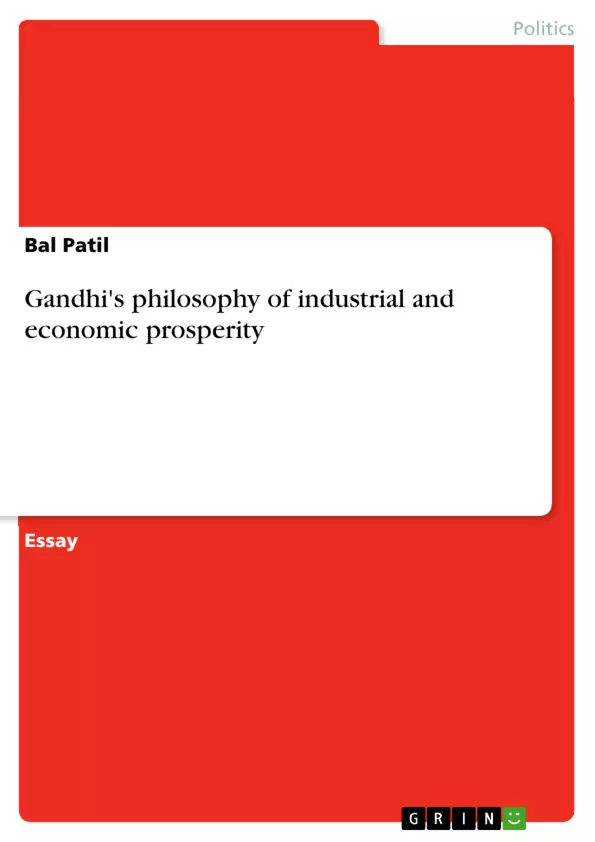“Whenever you are in doubt, or when the self becomes too much with you, apply the following test: recall the face of the poorest and the weakest man whom you may have seen, and ask yourself if the step you contemplate is going to be of any use to him. Will he gain anything by it? Will it restore him control over his own life and destiny? In other words, will it lead to Swaraj for the hungry and spiritually starving millions. Then you will find your doubts and … self melting away.”The Mahatma had an uncanny way of making things simple to the meanest intelligence. And the test mentioned above was Gandhiji’s philosopher’s stone for turning into the gold of service the base metal of doubt in our work a day world. The test, at the same time, provides a very important clue towards an understanding of the Gandhi’s economic and industrial philosophy.
Inhaltsverzeichnis (Table of Contents)
- Gandhi's Philosophy of Industrial and Economic Prosperity
- HINDI SWARAJ
- IRONICAL
Zielsetzung und Themenschwerpunkte (Objectives and Key Themes)
This article explores Mahatma Gandhi's philosophy of industrial and economic prosperity, drawing upon his writings and actions throughout his life, particularly in the context of India's independence movement. It critiques the modern industrial civilization and its impact on the common masses, highlighting the need for a more equitable and sustainable economic system.
- Gandhi's critique of industrial civilization and its impact on the common man
- The importance of self-reliance and the promotion of Swadeshi (indigenous goods and practices)
- The concept of Sarvodaya (the welfare of all) as a guiding principle for economic development
- The need for a more equitable distribution of wealth and resources
- The role of non-violent resistance in achieving economic and social justice
Zusammenfassung der Kapitel (Chapter Summaries)
- Gandhi's Philosophy of Industrial and Economic Prosperity: This section introduces Gandhi's philosophy of industrial and economic prosperity, highlighting his belief in the importance of simple living and the need to prioritize the welfare of the poorest and weakest members of society. It also examines Gandhi's critique of modern industrial civilization and its impact on the common masses.
- HINDI SWARAJ: This section delves into Gandhi's book "Hind Swaraj", which outlines his early thinking on material civilization. It explores his views on the need for India to unlearn aspects of modern civilization and adopt a simpler, more self-reliant approach to economic development.
- IRONICAL: This section examines the irony of Gandhi's transformation being influenced by an Englishman, John Ruskin, who advocated for a return to small-scale workshops and the humanization of industry. This section further explores Gandhi's aversion to industrialism and his distinction between machinery itself and the "craze" for machinery.
Schlüsselwörter (Keywords)
The article focuses on the key concepts of Gandhian economics, industrial civilization, Swadeshi, Sarvodaya, economic equality, non-violent resistance, and the need for a more equitable and sustainable economic system. It also examines the influence of Ruskin's "Unto This Last" on Gandhi's philosophy.
- Quote paper
- Bal Patil (Author), 2010, Gandhi's philosophy of industrial and economic prosperity, Munich, GRIN Verlag, https://www.grin.com/document/157282




